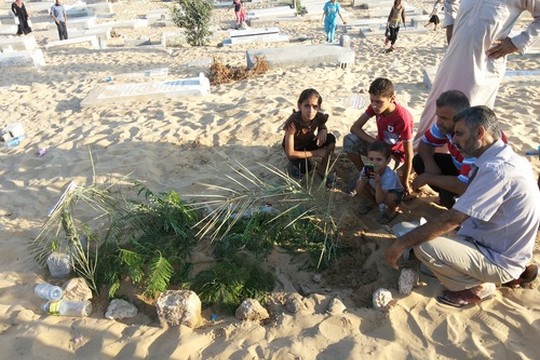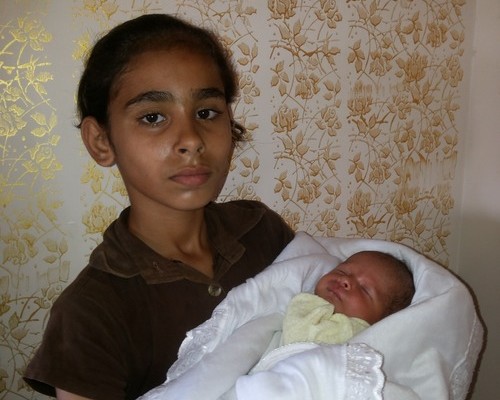Rasha Abu Oda fled her Gaza home, took shelter in a UN school, was injured in an Israeli strike and then died while giving birth. The war in Gaza may have ended, but Gazans are just starting to pick up the pieces of their broken lives.
By Awni Farhat
The aggression of the Israeli army against the Palestinian people of the Gaza Strip ended last Tuesday evening, however the suffering and grief of those who lost their loved ones and their homes continues.
The story of Rasha Abu Oda is one of countless heartbreaking stories that I could write about. Rasha was 30 years old when she died while delivering her baby during the Israeli assault on Gaza.
“We had left our home because of the Israeli incursion, and taken shelter in the UNRWA school in Beit Hanoun,” Rasha’s husband, Nidal Abu Oda, told me. “Then the school yard was hit by the Israelis – 15 people were murdered and dozens injured. So we were forced to move on again, and ended up at the Jabaliya [refugee] camp’s school, where I spent the last days with my wife.”
Abu Oda continued: “On Sunday August 24, before sundown, they hit a house near the school where we were taking shelter. It was a huge explosion and my wife fell down and hurt herself, screaming in fear as she was expecting to have our baby at any moment. We called for an ambulance but it was delayed in reaching the school by the attacks. We couldn’t make it to Al-Shifa hospital because the road was too dangerous, so we went to a smaller one nearby.
“We ended up Al-Wada hospital, my mother and me waiting together for Rasha to have her baby. Explosions surrounded us, and later we heard an ambulance crew saying that a shell hit the Joda family’s yard, killing the mom with four of her children. We heard more ambulances arriving.”
Things then took a turn for the worse. “From the beginning of the attacks, my wife was living in fear and horror. She gave birth with explosions around us; they saved our baby with an operation but Rasha was bleeding inside and she died. Her heart stopped and she passed away. Now the attacks are over and I’m still at this school, homeless and widowed.”
Rasha’s sister, Noor, is still in shock, “We were in the school waiting for Rasha to come home with the new baby when we heard that she had died. We were so shocked – I still can’t believe that my sister died. She wanted to wear a white dress to my brother’s wedding, now she’s wearing a white shroud.” She began to cry, “She was like a mom, all our neighbors and family loved her.”
Rasha’s mom laments, “The last thing she saw was her baby’s face. Rasha knew she was dying… she asked me to see her baby’s face. Then she passed away. Our homes in Beit Hanoun are totally destroyed, and my daughter’s life as well.”
I was shocked when I talked to Rasha’s 14-year-old brother, Loai. He spoke bitterly: “When a person dies, he goes somewhere safer and more peaceful than here. Our lives here are full of shit.”
There are approximately 350 newborn babies living with their displaced families in a number of UNRWA schools in Gaza, in increasingly unsanitary conditions. Furthermore, at least 100,000 Palestinians are now displaced, as their homes were demolished or severely damaged by in Israeli strikes.
According to preliminary assessments from the UN Office for the Coordination of Humanitarian Affairs, the Palestinian death toll stands at 2,104, with 1,462 people identified as civilians, including 495 children. In addition, more than 100,000 people whose homes were destroyed or severely damaged will need longer-term shelter solutions. Despite work to repair infrastructure, most areas of the Strip still experience electricity outages of 18 hours a day, and only 10 percent of the population receives water once a day for six to eight hours, while 75 percent of the population only has access to water every four or five days.
Awni Farhat is a 25-year-old freelance interpreter/translator, social worker and community activist. He has lived in Jabalia refugee camp in the Gaza Strip all his life. This article first appeared on the author’s blog, and you can read it in Hebrew on Local Call.
Related:
Gaza dispatch: When tanks shell refugee camps
PHOTOS: Gaza’s half-million displaced
War is the new system of governance (and five other Gaza takeaways)


